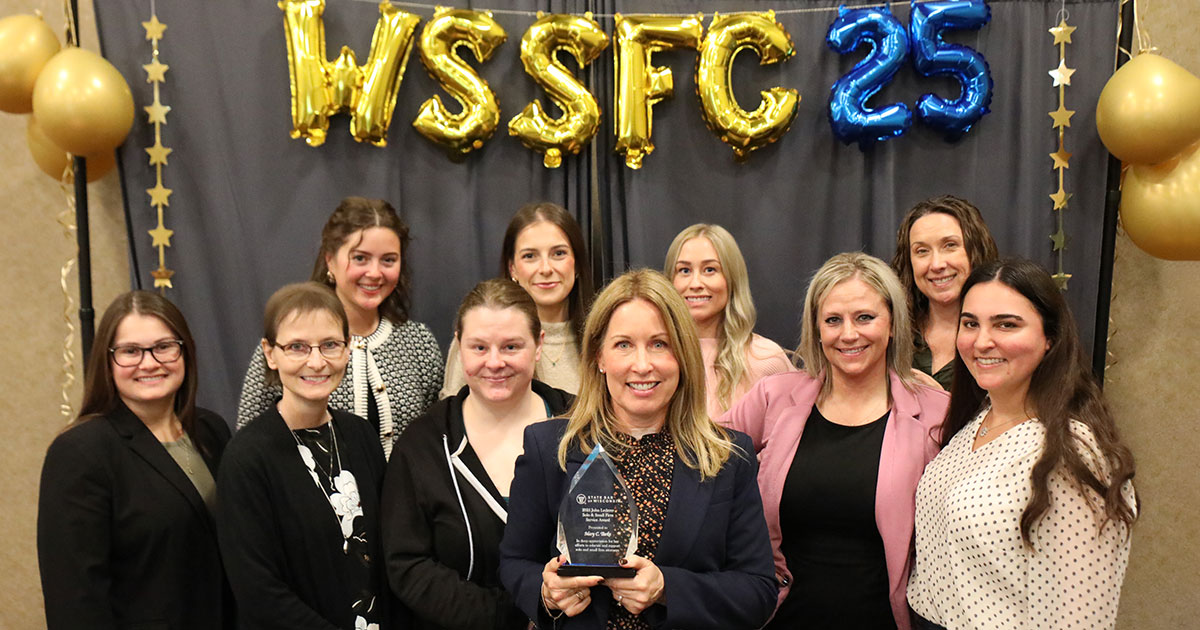
Madison attorney Mary C. Turke was celebrated as the 2025 recipient of the John Lederer Distinguished Service Award for her commitment to excellent small-firm practice and helping attorneys thrive. For more photos of WSSFC,
see the album on the State Bar of Wisconsin Facebook page. Photos by Shannon Green and Kara Olson.
Oct. 22, 2025 – Computer technology has become so readily available and advanced that everyone is at risk from falsified identification – deepfakes – warned presenters at a plenary session last week at the 2025
Wisconsin Solo & Small Firm Conference.
State Bar of Wisconsin members attending the conference at the Kalahari Resort & Convention Center in Wisconsin Dells Oct. 16-18 learned those details and much more, from artificial intelligence (AI) and practice skills to issues of ethics, wellness, and balance.
The face on the driver’s license, passport, or Zoom call may not be real, and the technology to do that, which cost $10,000 in 2021, is now available worldwide for free, explained
Cheryl “Cheri” A. Hipenbecker in “Navigating Deepfake Technology.”
In addition to new technology that ferrets out deepfakes, one of the best ways to begin to alert oneself to the fake starts low-tech.
“Anytime you’re moving money, stop and smell the roses,” advised Hipenbecker, who is general counsel for Knight Barry Title, Inc. in Milwaukee.
Scams may succeed because the emails create a sense of urgency that does not exist, Hipenbecker said.
“Why is it so urgent?” Hipenbecker asks. “We can wait until tomorrow.”
It’s best to reach out to your contacts through known telephone numbers, perhaps using code words known only to both of you, to work through whether the request is legitimate, Hipenbecker said.
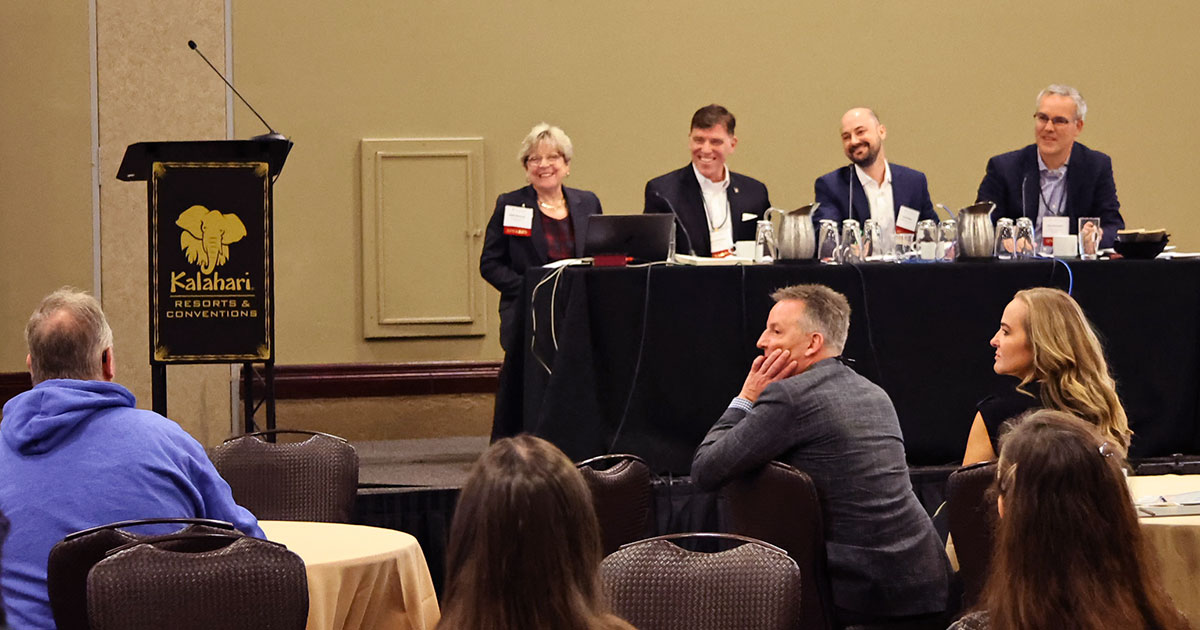
Opening plenary session “Litigation ABCs: P is for Pleadings.”
Hybrid Fee
Contingency and billable-hour fees are well known, but they can be blended into a “hybrid,” explained
Dixon R. Gahnz of Lawton & Cates, S.C. in Madison, in “Solo but Not Sinking: Profitable Practice Strategies for Small Firms.”
The hybrid fee arrangement, which the firm may use in business cases, includes a lower contingency fee rate of 20% and a lower billable hourly rate, Gahnz said.
The combination of the two reduces risk by providing monthly income and ensures that “the client has some skin in the game,” Gahnz explained.
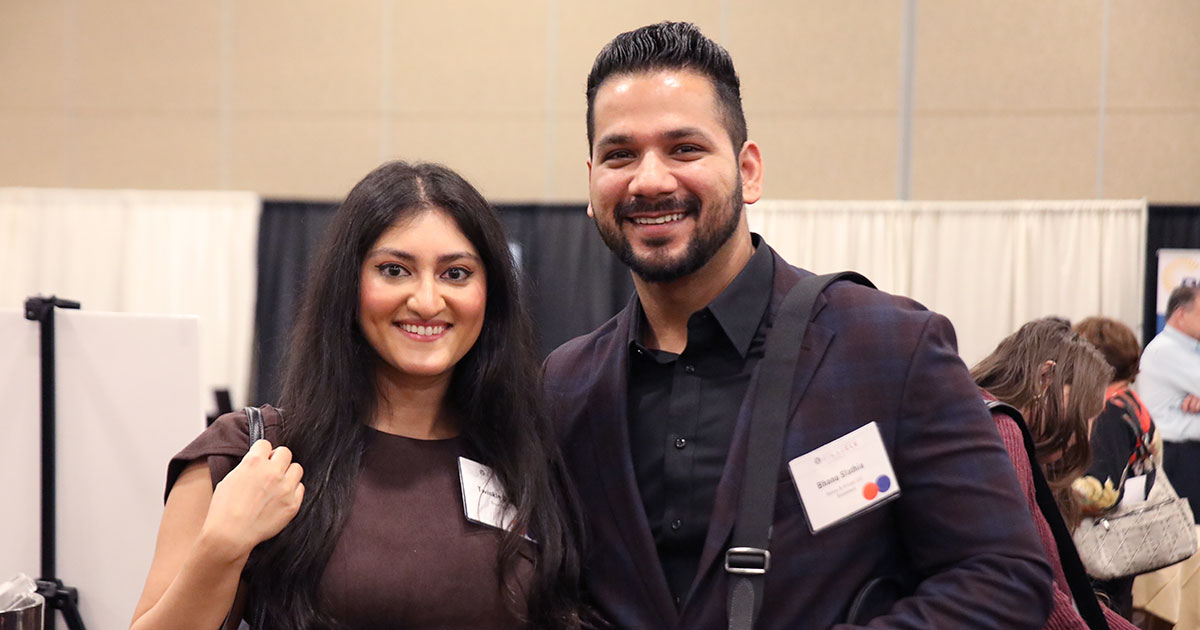
First time WSSFC attendees Twinkle Dutta and Bhanu Singh Slathia.
‘Can You Negotiate?’
Preparing clients for starting settlement is the first step in undertaking negotiations or alternative dispute resolution, advised
Nicholas C. Watt of Kramer, Elkins & Watt, LLC of Madison in “Can You Negotiate?”
Clients may begin by demanding, “I’m not going to settle for anything. I’m owed this. It’s about the principle of the matter,” Watt said.
“And then you get into several thousands of dollars of attorney’s fees.”
“You’ve just got to figure out when the right time is for your client, when your client is in the right head space” to attempt settlement, Watt advised.
The process may roll out first as a demand letter, followed by initial discovery in litigation and mediation, Watt said.
The lawyer also needs to prepare the client for the mediation session, making sure the client knows what it involves and determining the goals, because going to mediation also requires being ready, Watt said.
“A lot of mediators that I’ve been involved with, my go-to mediators, they read the room. It's more about reading the room, the personalities, … trying to get them to a place to come to an agreement and managing the personalities as well as the facts involved,” Watt said.
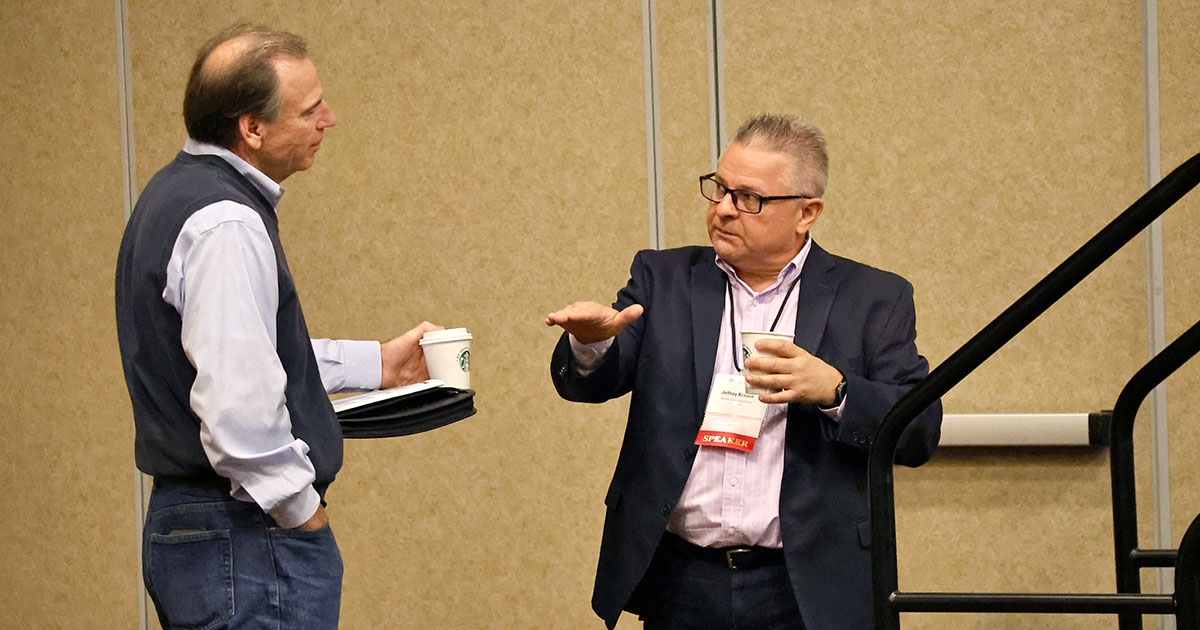
Presenter and attorney Jeffrey S. Krause takes a question from an attendee after his session on the state of law firm technology.
High School Athletics Legal Issues
Legal issues involving high school sports are growing, said
Joshua M. Frieser of Frieser Legal LLC of Milwaukee. Although most matters that he sees involve eligibility challenges, the growing attention to high school athletics may make any legal issue bigger.
 Jay D. Jerde, Mitchell Hamline 2006, is a legal writer for the State Bar of Wisconsin, Madison. He can be reached by
email or by phone at (608) 250-6126.
Jay D. Jerde, Mitchell Hamline 2006, is a legal writer for the State Bar of Wisconsin, Madison. He can be reached by
email or by phone at (608) 250-6126.
With ready access to social media, a student’s First Amendment rights, a fairly uncommon topic, may be one of those growing issues with “significantly more opportunities for student speech to become problematic to a school district,” Frieser said.
Under
Tinker v. Des Moines Independent Community School District, “students do not shed their constitutional rights to freedom of speech or expression at the schoolhouse gate,” Frieser explained.
The test is whether the activity substantially disrupts school operations, he said.
A fight in school, in gym class, or on the game field may cause such disruption. Students have been suspended for social media posts that criticized coaches and referees, Frieser explained.
Athletes have worn Black Lives Matter shirts, kneeled during the National Anthem, or carried “certain flags during a medal ceremony.”
The answers to challenges with such facts may be different for a high school athlete than in professional sports, in which athletes are employees, Frieser said.
In most high schools, “we’re talking about public schools,” Frieser said, and students “obviously do have those First Amendment protections because we’re talking about a government actor that’s regulating political speech.”
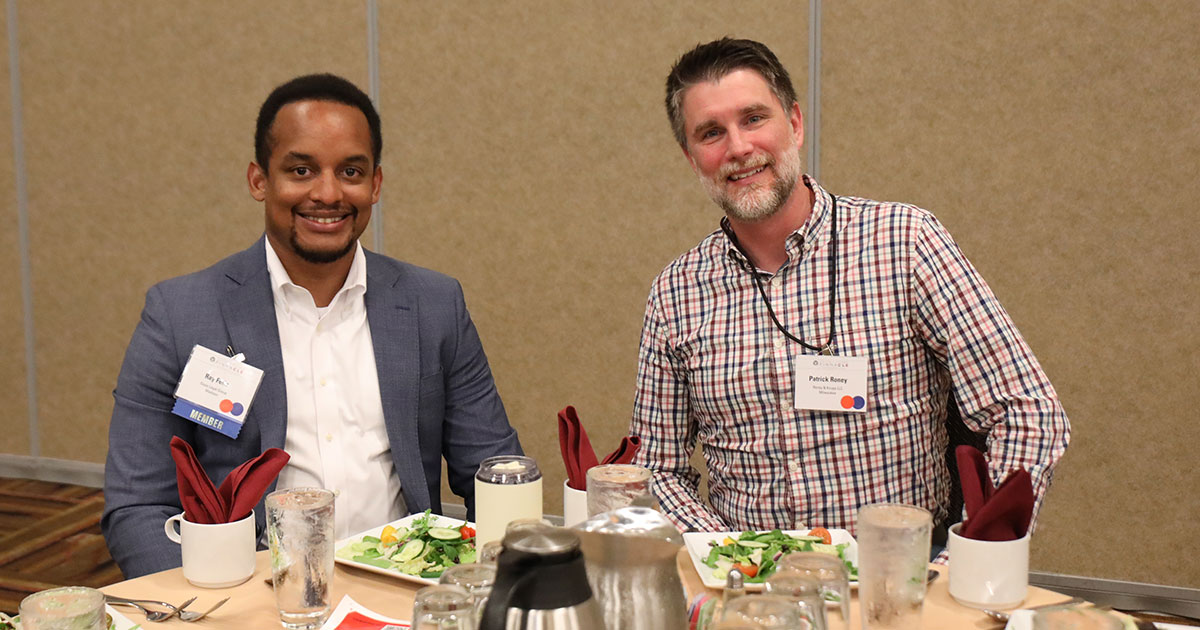
Attendees Ray Feliz and Patrick Roney connect during the Networking Lunch and Lederer Award Presentation.
Transformative Changes
Jodi A. Klagos of Godfrey & Kahn, S.C. in Madison attended law school at the age of 34 to help people, what she considers for all lawyers “a really unique opportunity to serve people.”
“A lot of the people we’re dealing with are in situations where they need help, and they’re dealing with a lot of really heavy emotional things, and we need to be able to offer compassion to them,” Klagos said.
“You have to be able to act on that empathy, but in order to be able to do that, you have to fill your own cup first.”
For Klagos, instead of starting her day reading emails and immediately getting angry, she now begins with meditation.
Mindfulness and meditation are ways to make that change, and everyone will have a method that works better for them, Klagos said. Most importantly, start small.
Rachel T. Schromen of Schromen Law LLC in St. Paul, Minn., followed a path through major life challenges, which, at times, harmed her professional abilities.
She found resources and ways to refocus and better balance her practice with those challenges.
“Life transitions can shift professional identity,” Schromen said. “You can reflect. Is the old path, the old way of doing things, still aligned?
“You can always step back from work you’re doing, whether it’s a certain area of law, a number of clients, a certain case, you can step back temporarily. You can redefine your practice and area or focus.”
That evolution follows the lawyer through life – to the decision to retire, as
J. David Krekeler of Krekeler Law S.C. in Madison and
Thomas R. Schumacher of Bakke Norman S.C. in New Richmond described.
Retirement can be difficult for personal and professional reasons. One’s practice is one’s identity. It may be difficult to find someone to take over the firm because not every lawyer is an entrepreneur.
Full retirement may not be the best solution, but pulling back offers the ability to do what one really wants to do.
“I would suggest that you figure out what it is that you want,” Krekeler said. “What are the things and areas of practice that you love the most?”
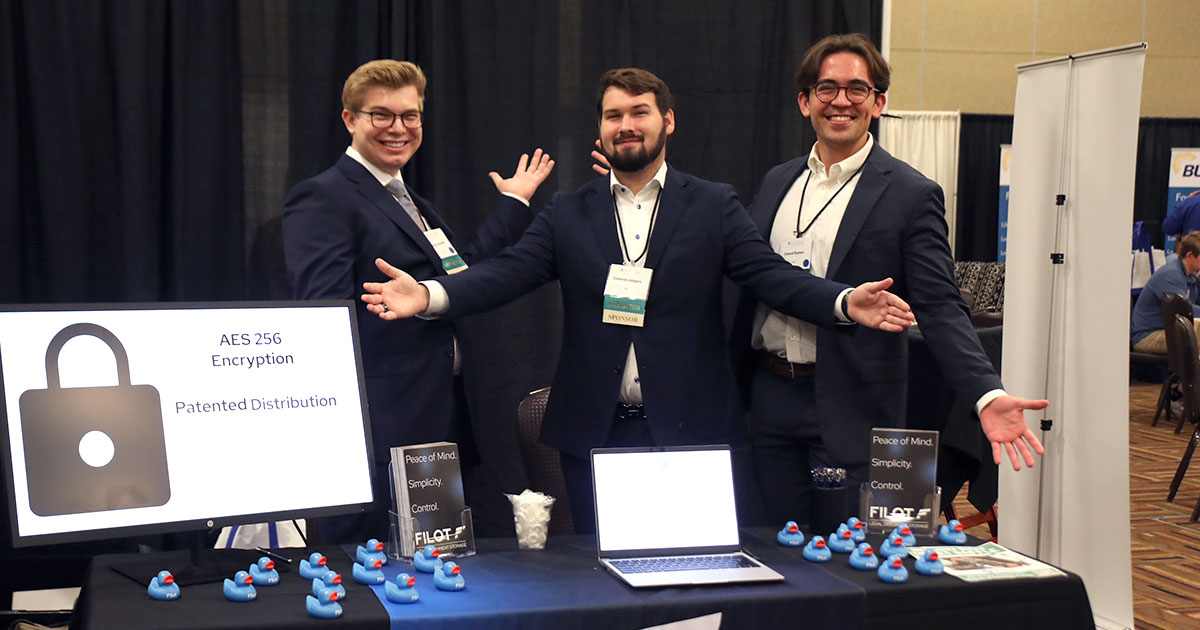
Numerous friendly exhibitors were on hand to share practice management and legal technology solutions for attorney needs.
Haunting Legal Issues
“So, we’re near Halloween,” said
Alexander “Sandie” T. Pendleton of Pendleton Legal, S.C. in Milwaukee, “so my comment on AI and you drafting a complaint or drafting a motion is, beware.”
“You can really get into some problems if you’re using AI to draft your complaint.”
Pendleton, in the opening plenary session “Litigation ABCs: P is for Pleadings,” warned: “never put a client’s name into a prompt” for AI “because that goes into their big language model, and it may pop up someplace else.”
“Never rely on AI” for cases cited in a pleading because of the risk of AI hallucinations – made-up cases and citations – which get the lawyer in trouble with the judge, Pendleton advised.
“And quite frankly, it’s just a great way to look stupid to the general public because it seems like the press loves those types of stories.”
If the house for sale is haunted, the contours of disclosure vary, explained real estate attorney
Kevin D. Trost of Trost LLC of Madison in “25 Things Every Lawyer Should Know.”
If the property involves “considerations of visual apparitions or … bumps in the night,” the broker doesn’t need to disclose under Wis. Stat.
section 452.23(2)(a).
The statute doesn’t require disclosure if the property “was the site of a specific act or occurrence, if the act or occurrence had no effect on the physical condition of the property or any structures located on the property.”
But, if “the walls of the house bled,” a broker may have “to disclose that one” under the statute, Trost said.
An owner filling out a real estate condition report may have greater duties to disclose, Trost suggested.
A defect “includes a condition that would have a significant adverse effect on the value of the property,” which Trost said arguably could include the effects of paranormal residents.
Because a buyer will likely learn about haunting conditions soon after moving in, Trost concluded, “sellers are likely better off to have disclosed these types of facts beforehand and avoid potential future litigation issues.”
See You Next Year – Save the Date for Oct. 22-24, 2026!
This article offers just a small snippet of all the information and networking opportunities at this year’s Wisconsin Solo & Small Firm Conference.
Special thanks to all the
sponsors and exhibitors who made the exhibit hall a vibrant showcase for attendees.
Did you attend this year but miss a breakout session? Select breakout sessions were recorded, and attendees can access the first two sets of WSSFC webcasts as a part of the registration package. Keep an eye on
WisBar Marketplace for the WSSFC webcasts.
